
Time to Speak Russian__Grammar Notes
.pdf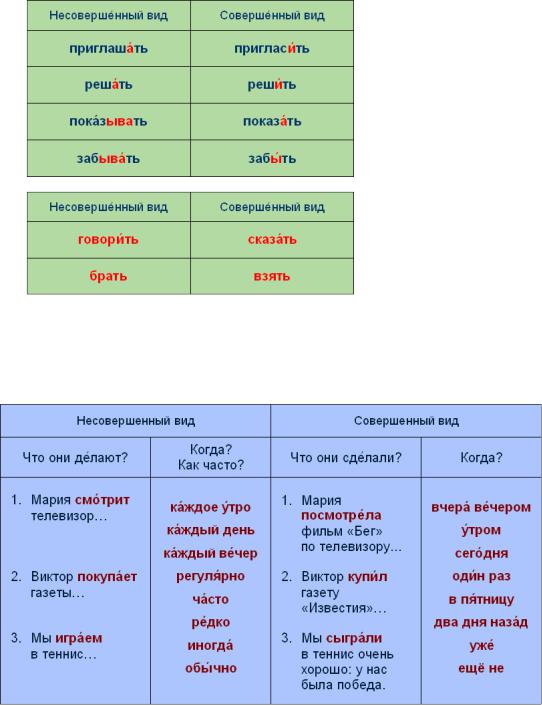
20.06.2015 |
Time to Speak Russian::Grammar Notes |
3. By means of using a completely different verb
USING IMPERFECTIVE AND PERFECTIVE VERBS
How to use imperfective and perfective verbs to describe repetitive vs onetime actions that produced certa
When we want to describe a repetitive action which takes place regularly, we should use an imperfective verb. If an action to particular moment (date or hour), and we know its end result, and we are interested in this result we should use a perfectiv
Please, note that when we want to describe repetitive actions, not only do we use imperfective verbs but we also offer extra in in a sentence certain words (e.g. adverbs) that signal repetition: "иногда" (occasionally), часто (often), регулярно (regularl afternoon), etc.
Ирина не любит готовить, она редко готовит.
Phrases with the word "каждый" (every) that signal repetition: "every day", "every morning", "every year", etc. should be case (4).
Мы завтракаем каждый день утром в 8 часов. Родители звонят мне каждую неделю.
When we speak about an action that happened only once or at one point in time but we are interested in its end result, we us
Я купила вкусный торт – вот он, давай его съедим!
Друзья посмотрели новый фильм вчера – фильм им очень понравился.
Compare:
Марина обычно не покупает вещи в магазине, а покупает их на рынке. Но сегодня она увидела на рынке красивое п купила их.
Игорь редко звонит мне домой так поздно, а вчера вечером он почемуто мне позвонил.
The Pronoun " СВОЙ"
You already know that when we want to express that a certain object belongs to someone, in Russian we use possessive pron
http://www.speakrussian.cie.ru/time_new/eng/grammar/ |
41/59 |
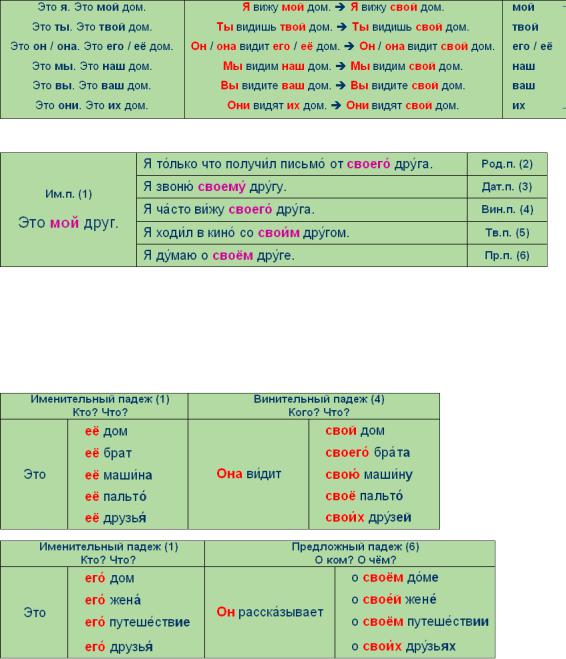
20.06.2015 Time to Speak Russian::Grammar Notes
For example:
Это я. Этой мой дом.
Вот мой друг. Мы давно знаем его жену.
Здесь учатся студенты. Я покажу тебе их аудиторию.
In addition to the possessive pronouns, we can use a reflexivepossessive pronoun "свой" to indicate that an object belongs t the subject in a sentence.
The pronoun "свой" is inflected (modified) for gender, case and number in exactly the same way as possessive pronouns:
Attention! A noun in the Nominative case can only by accompanied by a possessive pronoun (мой, твой, наш, ваш, etc.). Th never used with the Nominative case noun.
"Это я, это мой друг". "This is I, this is my friend". "Друг" is the sentence subject indicated by a noun in the Nominative
"Вчера к нам пришли в гости наши друзья". – "Yesterday our friends came to visit us". "Друзья" is the sentence subject the Nominative case (1).
The reflexivepossessive pronoun "свой" is used only if the agent and the possessor in the sentence is one and the same perso
Please, note that sentences with possessive pronouns and sentences with the reflexivepossessive pronoun "свой" differ in me
http://www.speakrussian.cie.ru/time_new/eng/grammar/ |
42/59 |
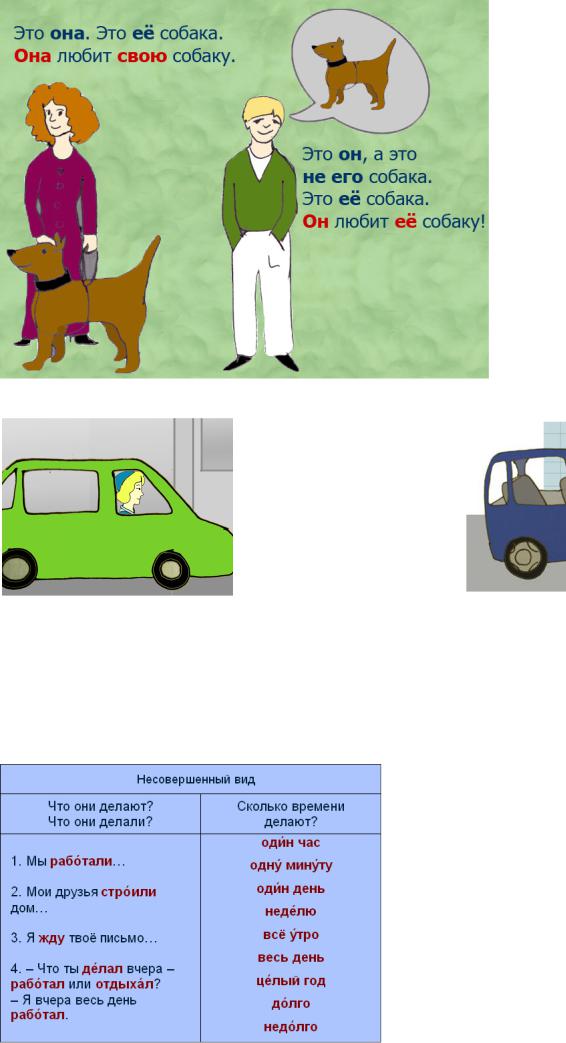
20.06.2015 |
Time to Speak Russian::Grammar Notes |
Это Вера и её машина. |
|
Это Кирилл и его маш |
||
́ |
́ |
|
́ |
́ |
Она ездит на работу на своей машине. |
Он ездит на работу на |
|||
́ |
́ |
́ ́ |
́ |
́ |
VERBAL ASPECTS (CONTINUED).
Using imperfective verbs to express that an action is, indeed, taking place and that
When we want to indicate that an action is/was taking place for a specific time period, we always use imperfective verbs and indicate the action duration. For example: долго (for a long time), недолго (for a short time), пять минут (for five minutes), year) etc. Word combinations that indicate duration must be put in the Accusative case (4).
Вчера я работал весь вечер.
Ты говоришь по телефону два часа!
http://www.speakrussian.cie.ru/time_new/eng/grammar/ |
43/59 |
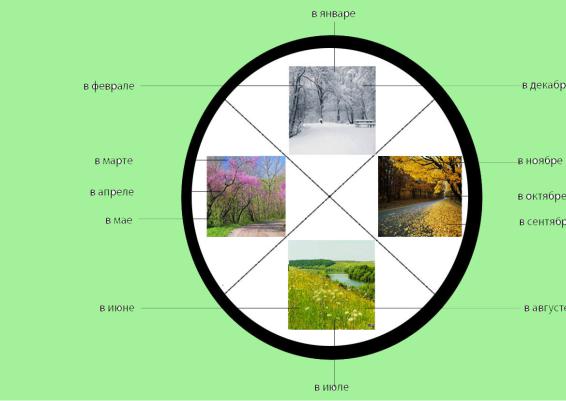
20.06.2015 Time to Speak Russian::Grammar Notes
When it is important for us only to establish that a certain action took place (or did not take place), we have to use the imper
– Марта читала русскую литературу?
– Да, Марта читала романы Льва Толстого. (Ответ положительный, данное действие было).
Мы вчера вечером смотрели телевизор. (Здесь важно только назвать действие, дополнительная информация – каку смотрели, сколько времени – не важна).
Compare:
–Вы смотрели новый фильм Феллини?
–Да, смотрели.
–Вы посмотрели новый фильм Феллини, фильм вам понравился?
–Да, мы посмотрели вчера этот фильм. Это прекрасный фильм!
In which month?
To indicate that an event happened or will happen in a certain month, we use a name of the month in the Prepositional case ( "b>в".
The Future Tense of Perfective and Imperfective Verbs.
In Russian there are two ways to express that an action will take place in the future, or, simply put, there are two future tense forms: future" form (for perfective verbs) and "a compound future" form (for imperfective verbs). In the future tense perfective and imperfe manifested just as they are in the present and in the past tenses. Compare:
"Я бу́ду чита́ть журна́л ещё час". – The imperfective verb «читать» is used to indicate the process ("I will continue reading a maga vs. "Я прочита́ю журна́л и дам его́тебе́". – The perfective verb «прочитать» is used to indicate the action’s result ("I will finish re will pass it on to you.")
The compound future form of an imperfective verb is composed of two verbs: the future simple tense form of the verb "БЫТЬ" "to change for person and number) + the infinitive of the imperfective verb:
быть+инфинитив
я бу́ду чита́ть ты бу́дешь чита́ть он бу́дет чита́ть мы бу́дем чита́ть вы бу́дете чита́ть они бу́дут чита́ть
The future form of the perfective verb (simple future) is constructed very simply indeed and similar to how present tense forms of i derived: by adding personal endings to the stem. Perfective verbs agree with the subject of the sentence in person and number:
чита́ю (НСВ, наст.вр.) – прочита́ю (СВ, буд.вр.), прочитаешь, прочитает…. пишу́(НСВ, наст.вр.) – напишу́(СВ, буд.вр.), напишешь, напишет… иду́(НСВ, наст.вр.) – приду́(СВ, буд.вр.), придёшь, придёт….
To choose the correct future tense form (derived from a perfective or imperfective verb), you should keep in mind the difference bet aspects. The future form of the imperfective verb ("the compound future") is used to denote a repetitive action that will take place in action (process) or a statement that a certain action will take place.
http://www.speakrussian.cie.ru/time_new/eng/grammar/ |
44/59 |
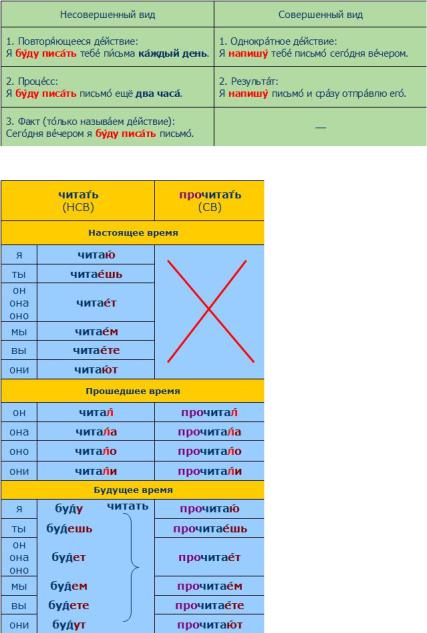
20.06.2015 Time to Speak Russian::Grammar Notes
The simple future tense is used to indicate a onetime action or action's endresult in the future:
Compare the conjugation of perfective and imperfective verbs:
Reflexive verbs
There is a gorup of verbs in Russian that end in ся. Ся is a reduction of a reflexive pronoun себя that became a part of a verb. Com
фотографировать себя = фотографироваться
одевать себя = одеваться
Such verbs are called "reflexive". They conjugate a bit differently: a personal verbal ending is added not at the end but rather is plac stem and the particle ся. Please, note that the particle itself also changes depending on the ending.
http://www.speakrussian.cie.ru/time_new/eng/grammar/ |
45/59 |
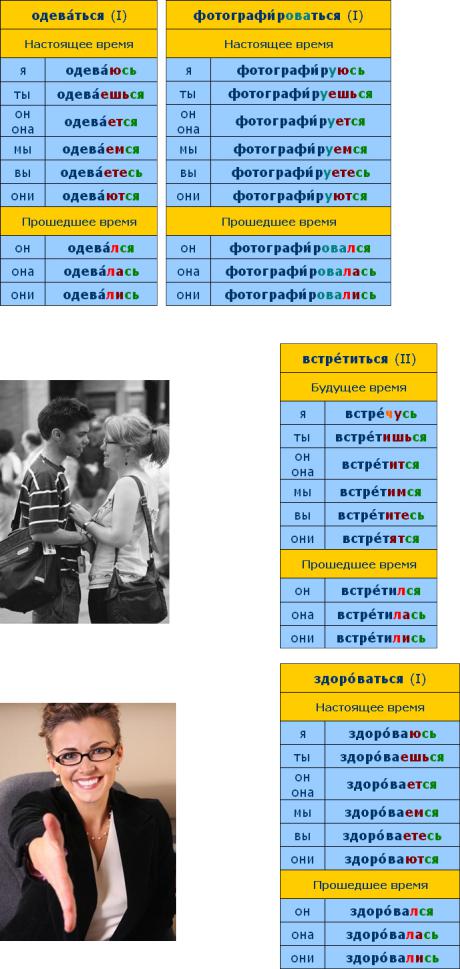
20.06.2015 |
Time to Speak Russian::Grammar Notes |
Reflexive "ся" verbs can also indicate a reciprocal action. In this case "ся" means "друг друга" (each other):
http://www.speakrussian.cie.ru/time_new/eng/grammar/ |
46/59 |
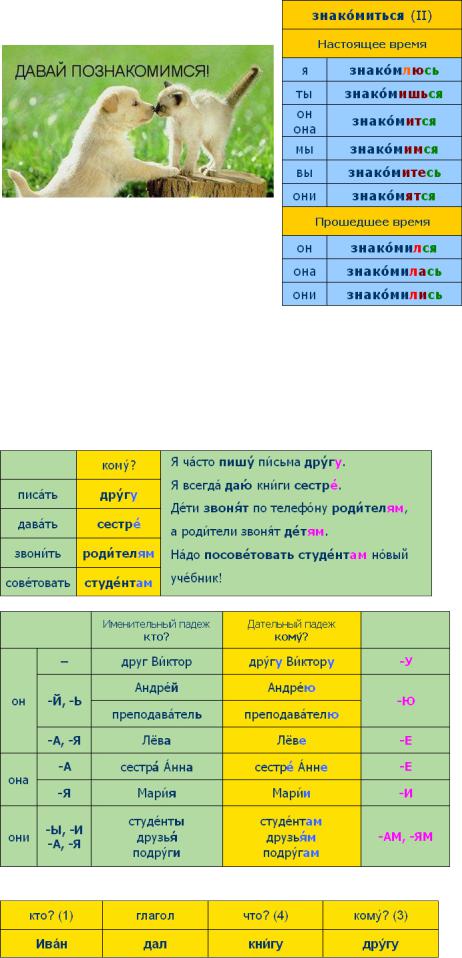
20.06.2015 |
Time to Speak Russian::Grammar Notes |
Please, note! Reflexive verbs exibit the same root consonant alternation patterns and suffixes changes as nonreflexive verbs.
Dative Case
Dative case indicating an addressee
When we speak, we usually address somebody. A person whom a speech or action addresses is usually indicated by a noun in the D answers the question КОМУ? (to whom?)
In Russian animate and inanimate nouns indicating the adressee are put in the Dative case (3) and after a verb.
Attention! Nouns denoting direct objects take the Accusative case (4). Nous denoting indirect objects (addressees) take the Dative ca After some verbs you can use an infinitive to describe an action more precisely.
http://www.speakrussian.cie.ru/time_new/eng/grammar/ |
47/59 |
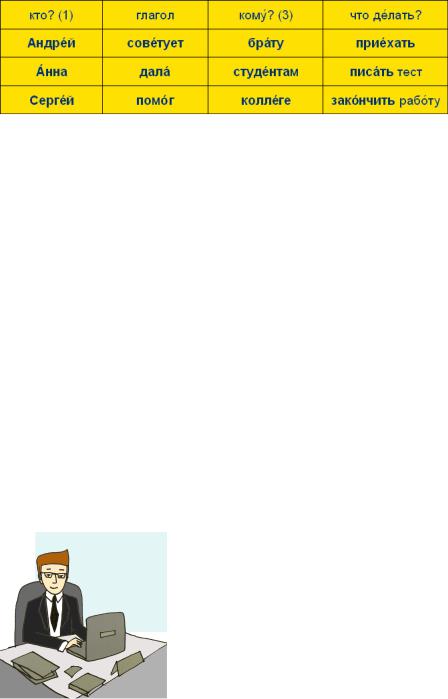
20.06.2015 |
Time to Speak Russian::Grammar Notes |
1.In the Russian language, nouns in the Dative case are also used to indicate an addressee of a letter/email or a telegram.
2.When we talk about cultural and historic monuments, a noun indicating the person to whom the monument is dedicated, also alwa
Памятник Пушкину Памятник Чайковскому
Памятник Петру Первому
3. If a motion is directed towards a person, we also use the Dative case with the preposition "К":
Марина сейчас едет в гости к Петру.
Вера вечером Иван пришел к Татьяне на день рожденья. Compare:
Идти, ехать (куда? – место – Винительный падеж) в театр, на выставку, на работу Идти, ехать (к кому? – человек – Дательный падеж) к Маше, к Виктору, к родителям
Verbs of motion with prefixes
Adding prefixes to the verbs "ИДТИ́/ Е́ХАТЬ" creates verbs with new connotations. The most commonly used prefixes are ПО, П REMEMBER! The verbs "прийти́/ прие́хать", "по́йти / пое́хать", "уйти́/ уе́хать" are perfective verbs!
ПРИЙТИ, ПРИЕХАТЬ
When a motion is directed towards an objective, and we want to say that we have (or haven’t) reached it, we use verbs with the prefi "приехать". These verbs are also perfective.
Он пришёл на рабо́ту. = Он на рабо́те.
http://www.speakrussian.cie.ru/time_new/eng/grammar/ |
48/59 |
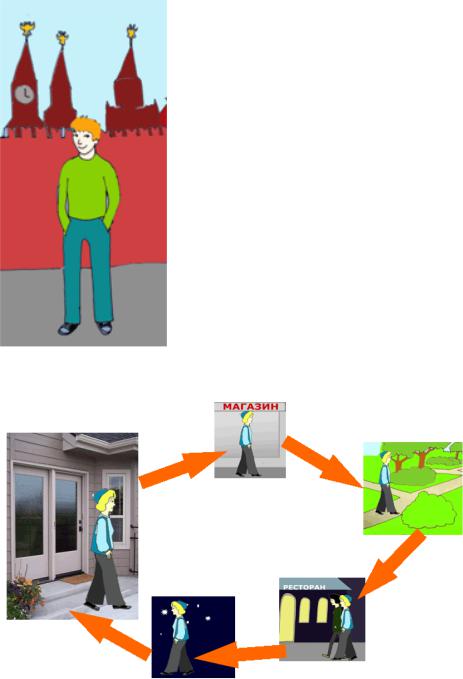
20.06.2015 |
Time to Speak Russian::Grammar Notes |
Он прие́хал в Москву́. = Он в Москве́.
The verbs "прийти́/ прие́хать" can also mean “to return”.
"Я до́лго гуля́ла вче́ра и пришла́(= верну́лась) домо́й то́лько в 11 ве́чера" "Yesterday I walked for a long time and came home Take a look at how these verbs conjugate:
http://www.speakrussian.cie.ru/time_new/eng/grammar/ |
49/59 |
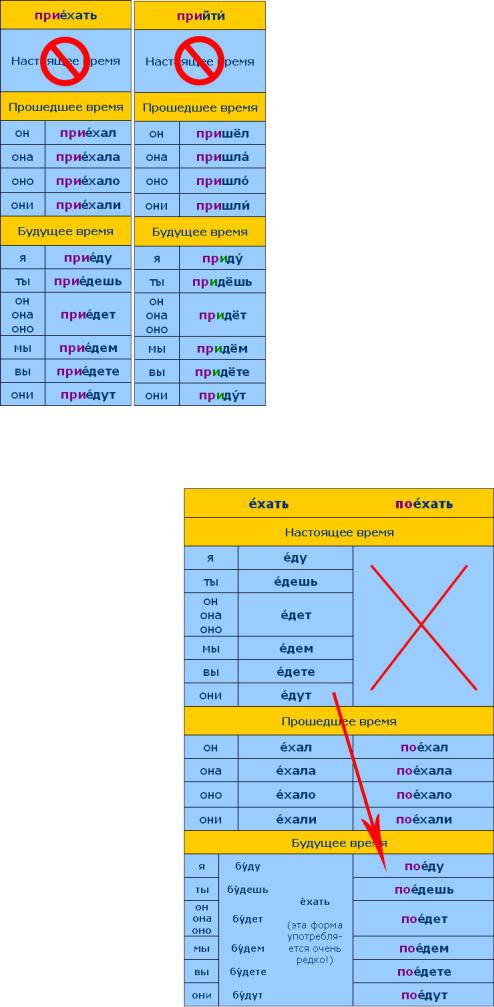
20.06.2015 |
Time to Speak Russian::Grammar Notes |
ПОЙТИ, ПОЕХАТЬ
The verbs ПОЙТИ́and ПОЕ́ХАТЬ are derived from the verbs ИДТИ́и ЕХАТЬ́ ; the prefix ПО is added, and they become perfecti how "идти́/ пойти́", "е́хать / пое́хать" conjugate and compare them:
http://www.speakrussian.cie.ru/time_new/eng/grammar/ |
50/59 |
